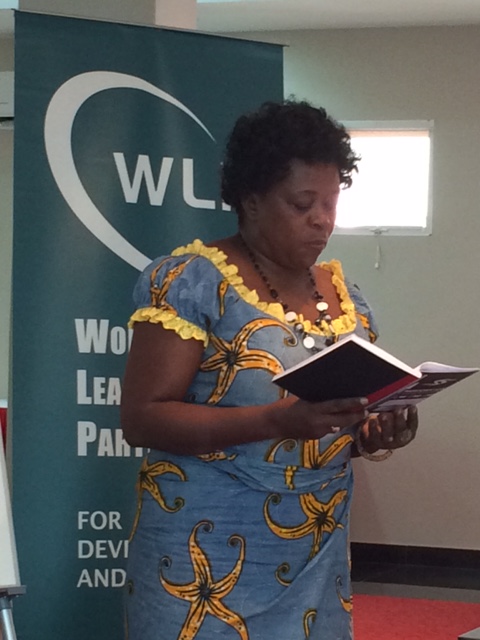Fórum Mulher
Fórum Mulher
Fórum Mulher, a women’s rights network in Mozambique, promotes women’s autonomy and solidarity, and advocates for women’s economic, social, reproductive, and political rights through coalitions at the local, regional, and national levels.
Partner Focus Areas
Partnership Highlights
About Fórum Mulher
Founded in 1993, Maputo-based Fórum Mulher is a network of individuals and civil society organizations who are participating in national and international social movements to defend gender equality and women's human rights, and who are promoting economic and socio-cultural transformations. Fórum Mulher works to strengthen the capacities of its members to improve Mozambican civil society. Its advocacy and programs focus on women’s political participation and movement building, women’s economic autonomy, sexual and reproductive rights, and ending gender-based violence. Through its ongoing advocacy, Fórum Mulher is helping to shape the new family law in Mozambique, giving greater recognition and protection to women and girls. Fórum Mulher works with grassroots and rural women, activists, academics, political candidates and parliamentarians, and journalists, among many other constituencies working for a more just society.
Fórum Mulher began collaborating with WLP Brazil/CEPIA in 2012 through WLP's Lusophone regional training initiative, and formally joined the WLP partnership in 2014. Since then, Fórum Mulher has continued to work closely with the Lusophone network and to integrate WLP’s methodology and curricula into its trainings and advocacy campaigns with national women’s rights NGOs. Fórum Mulher works primarily in Portuguese.
Recent Accomplishments
- In March 2022, Forum Mulher hosted an event titled “Climate Justice and Food Sovereignty: The Way to Sustainability and Economic Autonomy in Mozambique and South Africa” at the 66th United Nations Commission on the Status of Women.
- Forum Mulher organized a national conference for women on land policy in Mozambique. During this conference, rural women came together to publish a statement on the revision of land policy. The statement was published and submitted to the Ministry of Land and Forum Mulher has been advocating for the government to work with rural women on their review of the land policy.
- In September 2022, Forum Mulher organized the 14th World Women’s Congress, which gathered over 2,000 researchers and CSO representatives in Maputo. The theme of the Congress was “African feminisms – Building alternatives for women and the world through a corridor of knowledge that cares and resists”
- Forum Mulher helped to coordinate and participated in the African Rural Women Conference organized by the African Union in Maputo in October 2022. The conference gathered more than 200 people with representatives from rural areas from 40 countries.
- During the 16 Days of Activism Against Gender-Based Violence campaign of 2022, Forum Mulher organized a public march in solidarity with the women in the conflict-affected Cabo Delgado province. The march denounced all sexual violence that young women suffer and demanded the end of impunity.
Organizational Programs and Activities
Ending Violence against Women
- Through education, training, and participation in mobilization campaigns, Fórum Mulher influences decision-making bodies and public opinion on gender discrimination and policy changes to reduce gender-based violence.
- Fórum Mulher is hosting a competiton, in collaboration with MISA Moçambique and the Friedrich Ebert Foundation (FES), for the best research and writing on the impact of Mozambique’s 2009 Domestic Violence Against Women Act. The aim of the competition is to support small print, radio, and video investigative projects that expose cases and the causes of domestic violence in Mozambique.
Sexual and Reproductive Rights
- Fórum Mulher’s advocacy has focused on decriminalizing abortion, and educating decision-makers and the public about the negative social impact and harm to women that comes about when victims of rape are forced to marry their abusers.
Political Participation
- Fórum Mulher works with civil society organizations, networks, and campaigns that are pressing for policies that reduce poverty, improve social justice, and integrate gender equality. Fórum Mulher provides training and support for women who run for political office, and monitors municiple elections to evaluate their fairness. Moreover, Fórum Mulher reviews and reports on Mozambique’s compliance with international agreements and national gender policies that promote the interests of women and girls.
Institutional Capacity-Building
- The Fórum Mulher network is made up of 35 civil society organizations. Fórum Mulher works with these organizations and their constituents to build their organizational and leadership capacity through direct support and training.
Gender and Economic Equality
- Fórum Mulher’s economic equality efforts are multi-pronged. Fórum Mulher works with rural women organizers, and particularly the Rural Women’s Forum (FOMMUR), to increase land rights for women. Fórum Mulher advocates for women’s access to credit and savings and other strategies to improve women’s economic autonomy. And, Fórum Mulher promotes women’s engagement in trade unions, in particular for women in job sectors that are largely unregulated and underpaid, such as domestic workers.

